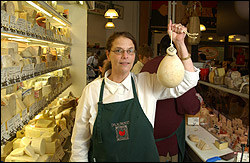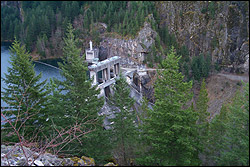What makes a good cheese? It takes more than a top-secret recipe, skill, and experience. Just as great wine depends on the quality of fruit from the vineyard, great cheese depends on the quality and type of milk it’s made from. That being the case, you’d expect that Washington, a state with a deep dairying tradition, would be a leader in producing fine artisan cheeses. Though some terrific cheese is made in Washington, quantities are still tiny and artisan cheese makers few. The reason? Due to vagaries of history and economics, would-be cheese makers can get only a small fraction of the milk they need to compete with Wisconsin, Vermont, Oregon, or even California.
You can discover the huge potential for artisanal cheese making hereabouts this weekend, when, thanks to the hard work and dedication of the folks at DeLaurenti Specialty Foods, the Pike Place Market plays host to the first Seattle Cheese Festival. Four Western Washington cheese makers will offer samples of their wares on the Market cobbles beside dozens of leading artisanal curd wranglers from around the country and abroad. A scavenger hunt for kids will leave parents free to visit the wine-and-cheese garden. Seminars for professionals and serious amateurs plus cooking demonstrations enrich the bill.
Farthest flung among local artisans is the Estrella Family Creamery of Montesano, about 100 miles southwest of Seattle, which specializes in raw-milk artisan cheeses from its all-grass-fed 17 cows and 30 goats, plus a few sheep. The Jensen family’s Golden Glen Creamery of Bow is a much larger operation, with 360 milking cows. In August 2004, the Jensens began producing cheddar, mozzarella, and Gouda-style cheeses, using their own natural pasteurized cow’s milk. Just across the water on Bainbridge Island is Port Madison Farm, where Steve and Beverly Phillips milk 80 Nubian goats to produce yogurts, chèvre, various soft cheeses, and a cheddar, all from pasteurized goat’s milk.
Kurt Beecher Dammeier, of Beecher’s Handmade Cheese, has no commute at all to the event. The cheese festival will be held right outside his Pike Place Market store, where throughout the day, onlookers can watch a vat of milk transform into curds, butter, or artisan cheeses. Rescheduled for the festival, the six-hour process starts at 10:30 a.m.
Dammeier’s two-year-old operation highlights the opportunities and limitations facing local artisan cheese makers. Cherry Valley Farms in Duvall provides Beecher’s with its milk. Like most dairy operations, Cherry Valley belongs to a marketing co-op. Farmers sell their milk to the co-op, which in return helps insulate members against abrupt and wild swings in milk prices. As long as Cherry Valley was part of the Vitamilk co-op, it could also sell to startup Dammeier—just as much (or little) milk as he needed. But now Cherry Valley is contracted to another co-op, Darigold, which pays a higher price to farmers who sell all of their milk to Darigold.
Today, Beecher’s not only uses all Cherry Valley’s output, it even owns part of the dairy’s herd, expanded just to meet Beecher’s expanded demand. But most beginning cheese makers can’t begin to use the volume of milk produced by even a modest-sized dairy. Dammeier has high hopes that Darigold will become more accommodating of artisan cheese makers. “Darigold isn’t ‘bad people.’ They’re really nice people. I think they might consider changing their policies. Individuals at Darigold are quite supportive.” But it’s going to take time to change a way of doing business that worked pretty well until the growing demand for artisan quantities of milk began to challenge the business plan.
For now, a small cheese maker pretty much has to generate all the milk to meet its own supply. This means keeping things small and efficient, but it also means a cheese maker can better control the quality of the final product. In Washington, milk sold through regular channels must be pasteurized, and, says Kelli Estrella, “you can’t make [cheese of] this quality from milk that has been pasteurized. We could never make this cheese from another source. It has to do with the breed of the animals, what they are eating. When the grass comes on, my butter is an incredible gold. The timing is another thing; we make the cheese when the milk is still warm from milking. That’s why we’re in the segment of the market we’re in.”
Beverly Phillips of Port Madison Farm credits their success to their Nubian goats, considered the Jerseys of the goat world, producing sweet and creamy milk with a smooth, velvety texture and no goaty aftertaste. Port Madison Farm has been making cheese without stabilizers or preservatives for about 10 years, always a hot item at farmers markets. “We’re always selling out,” says Phillips; “Frankly, we can’t make enough stuff to meet demand.”
Golden Glen Creamery has found a unique solution to the supply problem. They sell all of their milk to Darigold, but buy back 12 cows’ worth at the going cheese-milk rate; the milk never leaves the farm. “We do need to ship to a processor, and they promise to take our milk,” says Brandy Jensen. “If the cheese processing drops off, which we are not anticipating, then they will always take our milk.” A drop in demand doesn’t seem likely; the Jensens’ cheese production has increased every month since they started making it less than a year ago.
The Jensens plan to offer 11 variations of cheddar and Gouda at the festival, plus a popular hand-stretched mozzarella that they make once a month. Ninety gallons of milk becomes 90 pounds of cheese. Their milk is also natural, without rBst (growth hormones) or added coloring. “The only thing that’s in our cheese is what’s supposed to be in there to make it,” says Brandy Jensen.
Beecher’s production is huge compared to most startup artisan cheese makers. Its most requested product is a nutty semi-hard cheese that is aged a year after being made from bacterial cultures that produce Switzerland’s premium Gruyère plus a cheddar culture. They also offer younger cheeses with savory world flavorings and fresh soft cheeses and curds, all made with pasteurized rBst-free cow’s milk.
There’s hope on the horizon for both small cheese producers and high-end dairy farmers. The Washington State Department of Agriculture wants to encourage artisan cheese making, so there’s a better chance than ever that regulations limiting its production will be loosened. For now, cheese fans still have much to celebrate, and the Seattle Cheese Festival offers a great opportunity to do it.
We, as consumers, are enriched by these unique artisan cheeses. What a privilege to be able to learn about the process, the varieties, and the stories behind the scenes. You’ll have a great chance of doing all three at the Seattle Cheese Festival.
DeLaurenti’s Seattle Cheese Festival runs Sat., May 14–Sun., May 15, at Pike Place Market. For details see www.seattlecheesefestival.com or call 206-622-0141.







